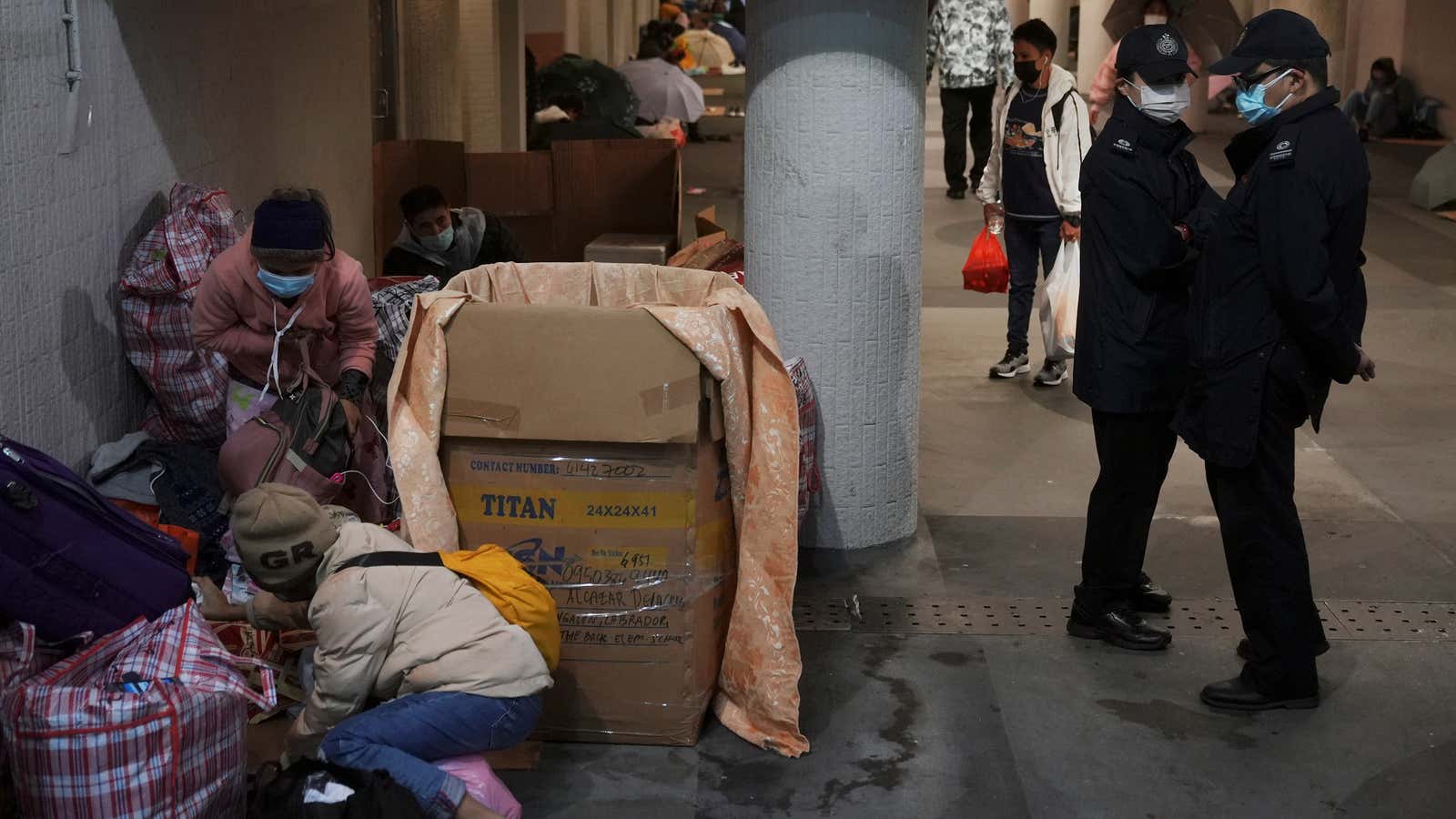Title your television drama series “Barrack O’Karma,” and have one of the actors put on brownface to play the role of a Filipino domestic worker. What could possibly go wrong?
Apparently, no one at Hong Kong’s dominant broadcaster TVB thought this was remotely a bad idea. In fact, local Chinese-language news outlets are celebrating it, praising the actor for her dedication and performance.
“Actress Franchesca Wong put on brownface to play a foreign domestic worker, but in reality she is actually a beautiful woman,” gushed one headline in the news outlet HK01 (link in Chinese).
Another article in HK01 praised Wong’s “impeccable” Filipino accent, adding that in spite of her brownface, the actress “is actually a beautiful woman, with very western makeup, and looks exactly like a Caucasian girl.”
Brownface and racist stereotypes
In the drama series, the Hong Kong- and Canada-raised Wong plays a Filipino domestic worker named Louisa, who’s just been hired to work in a local family’s home. But her employers quickly discover that Louisa (whom they rename “Lulu”) is eccentric, at least in their perception: she has shifty eyes, big mood swings, and plays with a voodoo-like rag doll (on which she draws a mouth with her own blood).
In one scene, Louisa discovers a hidden camera in her bedroom through which her employers have been spying on her. Scowling, she covers the camera with her hands. Naturally, the scene is shot like a horror film, with dark hues, discordant sounds, and spooky special effects.
The underlying racist stereotypes are brutally clear for all to see. The show depicts Louisa, the Filipino domestic worker, as an alien “other.” Her identity is distorted and flattened into a handful of essentialist qualities: dark skin, a comically fake accent, submissiveness, and “strange” behavior.
Hong Kong’s racism problem
Though it likes to style itself as “Asia’s world city” and a cosmopolitan hub, racism—both overt and covert—runs deep in Hong Kong and more broadly, China.
Last year, the now-shuttered Apple Daily published photos captioned “Southeast Asians don’t wear masks”—even though many others were also removing their masks from time to time. Meanwhile, early in the pandemic, many Africans in China were suddenly denied services by shops and restaurants and evicted from apartments and hotels. And who can forget the “Black person toothpaste” brand in China that finally dropped its racist moniker in December?
In Hong Kong, foreign domestic workers have long faced prejudicial treatment, including being denied the pathway to permanent residency available to white-collar workers even though many spend decades here working for local families. That discrimination has been made worse by the covid pandemic. Last year, authorities forced the city’s 370,000 domestic workers to undergo covid testing in part because they “have the habit of gathering on the weekends.”
And this racism has long bled into mass media depictions, perpetuating prejudices. In the late ’80s, a popular variety show depicted a Chinese actress in blackface playing a Filipino domestic worker. More recently, another TVB drama series called Come Home Love: Lo and Behold featured a Hong Kong actor playing a Filipino domestic worker. Fans praised the actor’s “maid accent” (link in Chinese).
But there are also Hong Kong depictions of minorities that don’t depend on racist tropes. The acclaimed 2018 film Still Human, for example, cast a Filipino-Hong Kong actor as a foreign domestic worker who finds common ground with her employer, a wheelchair-bound man.
“What’s really sad is that people who watched the [TVB] series don’t understand that it’s wrong and it should not be celebrated,” said Miles Sible, a Hong Kong-based Filipino actor and flight attendant. “There are a lot of talented Filipinos in Hong Kong. We can do so much more than these stereotyped roles.”
Greater public consciousness around these issues would be a good start.
“Prejudice is not new in Hong Kong media. Hopefully, this incident forces public broadcasters to confront the ethnic discrimination in their storytelling,” said Kristie Ko, a Hong Kong filmmaker who wrote and directed Ateh, a short film about a pregnant domestic worker in the city.
The film cast Sible, the Filipino actor, to play the domestic worker. No brownface was involved.
